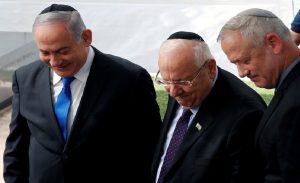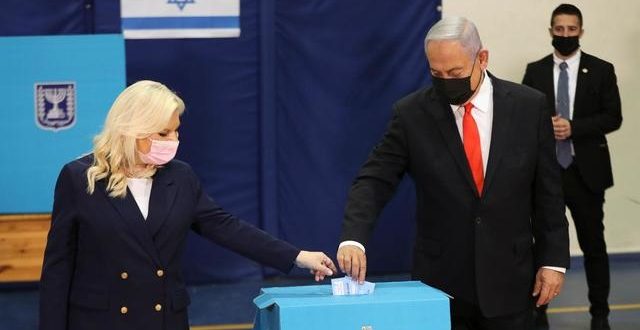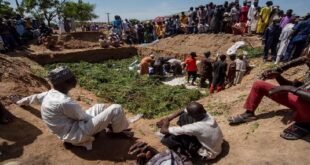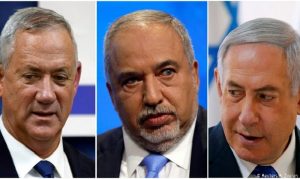24-03-2021
JERUSALEM: Exit polls indicated there is no clear winner in Israel’s election, leaving Prime Minister Benjamin Netanyahu’s fate uncertain and signaling continued political deadlock.
 The polls on Israel’s three main TV stations late Tuesday showed Netanyahu and his religious and nationalist allies, as well as diverse array of opponents, both falling short of a parliamentary majority. That could set the stage for weeks of paralysis and even an unprecedented fifth consecutive election.
The polls on Israel’s three main TV stations late Tuesday showed Netanyahu and his religious and nationalist allies, as well as diverse array of opponents, both falling short of a parliamentary majority. That could set the stage for weeks of paralysis and even an unprecedented fifth consecutive election.
Exit polls are often imprecise and the official results may not be known for days.
The exit polls conducted by Channels 11, 12 and 13 were nearly identical, showing Netanyahu and his allies with 53-54 seats in the 120-seat Knesset, Israel’s parliament. His opponents were projected to win 59, and Naftali Bennett’s far-right Yamina party was projected to win 7-8.
If the final results are in line with the exit polls, both sides will have to court  Bennett, a former Netanyahu ally with strained relations with the prime minister, to form a majority of at least 61 seats.
Bennett, a former Netanyahu ally with strained relations with the prime minister, to form a majority of at least 61 seats.
Netanyahu’s political survival appeared to rest with Bennett, a former defence minister.
Israel’s centre-left made a better showing than expected, according to the polls, but it also came up short in the 120-member parliament.
Bennett has said he would not serve under the centre-left group’s most likely leader, Yair Lapid, head of the Yesh Atid party.
Bennett, a former Netanyahu aide who has long sought to replace him at the helm, remained noncommittal about his coalition intentions immediately after polling stations closed.
“I will do only what is good for the state of Israel,” Bennett was quoted as saying by a spokesman.
Opinion polls had forecast a tight race between those who support Israel’s longest-serving leader and those who want “anyone but Bibi” as he is widely known.
“Vote, vote, vote, vote, vote,” Netanyahu said after casting his ballot in Jerusalem, his wife, Sara, at his side. He called the occasion a “festival of democracy”.
Polling stations opened across Israel and in the occupied West Bank, with some 6.5 million registered voters set to deliver a result that could prolong the worst period of political gridlock in the country’s history.
“This the moment of truth for the State of Israel,” said Lapid as he voted in Tel Aviv.
The Israeli electorate is deeply polarized with supporters hailing Netanyahu, 71, as “King Bibi”, and opponents holding up placards calling him “Crime Minister”.
 Lapid’s Yesh Atid party emerged as the main centrist alternative to Netanyahu’s Likud. He reflected the race’s stark rhetoric when he offered himself as an alternative to a “government of darkness and racism”.
Lapid’s Yesh Atid party emerged as the main centrist alternative to Netanyahu’s Likud. He reflected the race’s stark rhetoric when he offered himself as an alternative to a “government of darkness and racism”.
Netanyahu also faced challenges from a number of onetime allies who have formed their own parties after bitter breakups with the prime minister.
They include former protégé Gideon Saar, who broke away from Likud to form the New Hope. He said the party is a nationalist alternative unburdened by corruption charges and what he alleged is “a cult of personality” that keeps Likud in power.
A hard-line nationalist politician who was formerly Netanyahu’s education and defence minister, Bennett has not ruled out joining a coalition with the  embattled prime minister, allowing him to court both sides in future coalition talks.
embattled prime minister, allowing him to court both sides in future coalition talks.
Race between ‘right and extreme right’
The personality politics has so overtaken the race, there has been almost no mention of the Palestinians after years of frozen peace talks.
The day before the vote, Palestinian Prime Minister Mohammad Shtayyeh described the election as an “internal” matter for Israelis, but decried the effect on Palestinians living under Israeli occupation.
“All their electoral campaigns were at the expense of our land and our people, and parties are competing over more land, more settlements,” he said.
In Gaza, Hazem Qassem, a spokesman for Hamas, said the Israeli election seemed to be taking place between the “right and extreme right”.
Israelis vote for parties, not individual candidates. In Israel’s 72-year history,  no single-party list of candidates has been able to form a governing majority in the 120-seat Knesset.
no single-party list of candidates has been able to form a governing majority in the 120-seat Knesset.
Netanyahu has portrayed himself as a global statesman uniquely qualified to lead the country through its many security and diplomatic challenges.
He has made Israel’s coronavirus-vaccination campaign the centerpiece of his re-election bid and pointed to last year’s diplomatic agreements with four Arab states.
Opponents accuse Netanyahu of bungling the management of the coronavirus pandemic for most of the past year.
They say he failed to enforce lockdown restrictions on his ultraorthodox political allies, allowing the virus to spread, and point to the still-dire state of  the economy and its double-digit unemployment rate.
the economy and its double-digit unemployment rate.
Opponents also say Netanyahu is unfit to rule at a time when he is on trial for multiple corruption charges, a case he dismisses as a witch hunt.
Netanyahu has said he will not block the trial and looks forward to being exonerated, but critics suspect if he wins a majority, he may seek parliamentary action to delay or end the judicial process.
Tuesday’s election was triggered by the disintegration of an emergency government formed last May between Netanyahu and his chief rival Benny Gantz to manage the coronavirus pandemic. The alliance was plagued by infighting and elections were triggered by the government’s failure in December last year to agree on a budget.
Analysts expected voter fatigue to contribute to lower turnout, which had been at 71 percent in the most recent election a year ago.
Netanyahu’s religious and nationalist allies tend to be highly motivated voters.
In contrast, Palestinian citizens of Israel, disappointed with the disintegration of the umbrella Joint List party, are expected to stay home in larger numbers this time around. Voters in the more liberal and secular areas around Tel Aviv also tend to have lower rates of participation. (Int’l Monitoring Desk)
 Pressmediaofindia
Pressmediaofindia






